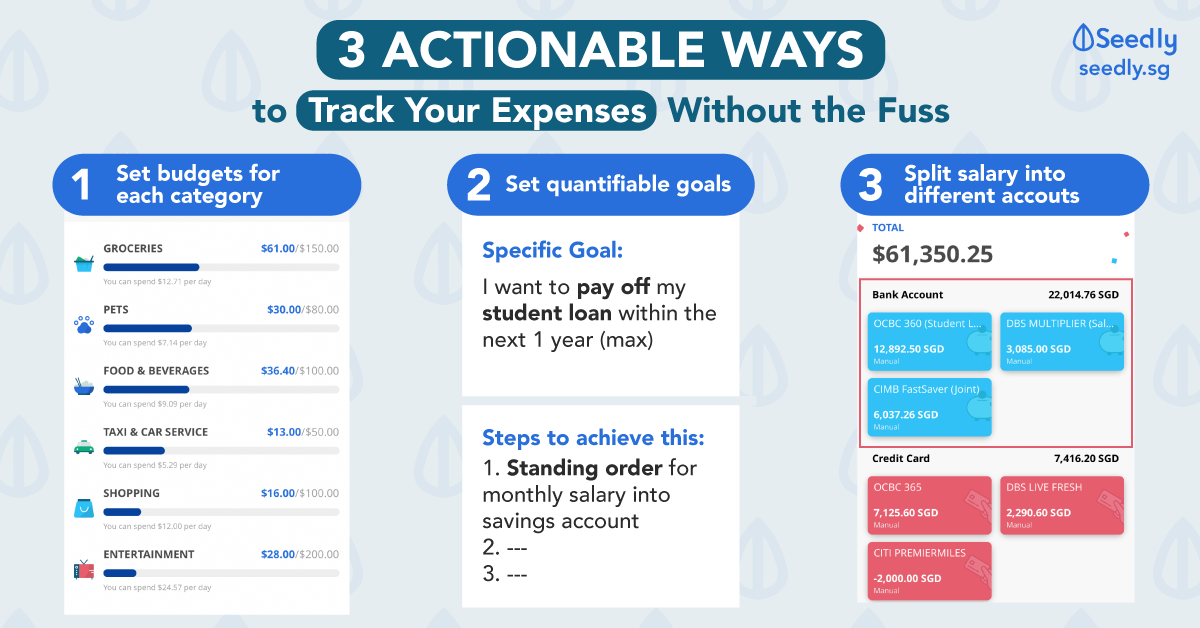Advertisement
Discussion (16)
Learn how to style your text
Cedric Jamie Soh
24 Dec 2019
Director at Seniorcare.com.sg
Reply
Save
I never got around to writing every transaction down. I go large picture, and then micro-zoom for selected parts because I design the process to be more "upfront".
Eg for personal spend, my two main parts are cash allowance, and credit card spend.
Allowance is automated transfer weekly, so I can see remaining balance in wallet and bank and get an idea. If really short, I do additional transfer and that is "overspend".
For credit card, I do a savings goal to save 1.5k every mth, and pay it with the balance in saving goal. Overspend means the goal will end up zero, but underspend means the goal has a balance.
Every year, I use ocbc money insights to categorize the spend transactions and then decide if I need to adjust the budget or cut certain expenses.
So you can see my main control is by seeing the balance left that I can spend method.
As long as I can keep within the budget, I see no need to micro manage, so I can use my time for the larger overall budget. But this comes after quite a few years of discipline for me.
I would say you could do spend tracking / analysis for a few months of transactions. It helps you understand your real self vs what you thought. But the more important part is what happens thereafter, be it overspending or not earning enough. The tracking itself doesn't do much, you will need to address the issues identified in the process to achieve results.
Tip: sometimes it helps to also look at the scale of things. start with
Last month's cash + current mth income - current mth expense = ending cash balance.
It shouldn't be difficult to identify all the income, so you would have solved three parts of the equation. The last part is total spending. Through the bank statements, and whatever you have done in manual tracking, you can start filling in the categories. If it doesn't add up, label the difference as "unidentified spending". For me, if unidentified spending is less than 0.5% of my take home salary, its ok and I proceed to work through analysis of the spend. If it is more than 0.5%, I put more effort to recollect for current month or try to track in following month.
Its better to work along the overall details than to spend too much time on minor details. If you have 99.5% of spending identified, you will find areas to work with already.
Eg if your take home income is 3k, and you already gather where 2985 goes, knowing what the remaining $15 (0.5% of 3k) will not really change what you will need to do.
Good luck!!
Reply
Save
Tbh I find it hard to track online expenses and the cashback that comes by too. I use expense manager - I won't say it's the best but since it has my data since forever, it's just convenient for me!
Reply
Save
Bjorn Ng
19 Dec 2019
Business Analyst at 10x Capital
The Seedly app is super useful!! And I get it, it's troublesome, but you just have to monitor it properly. And actually, why not just don't include cashback/points in your expenses? Treat those as a bonus!
Reply
Save
The app I am using is Daily Budget...
Read 12 other comments with a Seedly account
You will also enjoy exclusive benefits and get access to members only features.
Sign up or login with an email here
Write your thoughts
Related Articles
Related Posts
Related Posts
Advertisement









I use a simplified google sheet for my business spending
(the more simple, the easier to just type it in)
Seedly is great, my own complain is it does not link to DBS, so I can only track my OCBC and UOB spending.